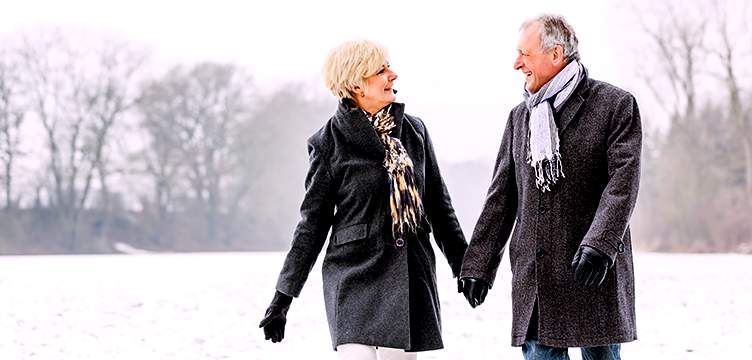We are in the middle of the cold, snowy, rainy, icy season. Unless you don’t go outside at all at this time of year, you are at risk for a winter fall. We all know they can be very dangerous for seniors. Nearly 50 percent of falls for older people happen outside. And winter is an especially treacherous time of year to try to get around because of the snow and ice on the ground (depending on where you live). Here are some interesting ideas to help you prevent falls.
- Stay physically active. The fitter and stronger you are, the less likely you are to fall. Exercise makes you stronger and improves flexibility and balance.
- Wear socks over your shoes. There was a study done on people wearing socks over their shoes, and it showed that the people wearing socks on the outside slipped much less than those wearing just shoes.
- When walking on slippery ground, focus on changing your gait. Try these tips: take short, flat-footed steps, point your feet out a little, and spread your body weight out over your feet. Make sure to bend your knees, and bend a little at the hip. You can also try walking sideways to broaden your base of support. Remember to give yourself a little extra time, and stop now and then to break the momentum.
- Keep your hands out of your pockets to improve your balance. Even better if you extend your arms out to the sides a little. Wear gloves to keep your hands warm and to protect them in case you do fall. It’s not a good idea to carry anything, but if you must, keep it light. When you carry something, it changes your center of balance, and can also be a distraction if you start to fall.
- Some folks like to use Nordic poles for walking on slippery ground. They give a lot of stability, while looking more sporty than a cane.
- Choose shoes with traction, like boots with non-slip rubber or neoprene soles. Grooved soles are much safer than flat ones. Crampons are another effective tool for increasing traction. They slip on over your shoes and have short spikes that help grip the ice when you walk. They have become more lightweight and available for mainstream use.
Our final piece of advice is to deal with your fear of falling. It is natural to be afraid of falling, especially if you have fallen already. That fear may cause you to stay indoors to avoid the chance of falling again, but resist the impulse to curb your activities. If you decrease your activity level, your muscles and bones become weaker over time, and you become more, not less, likely to experience a fall.






